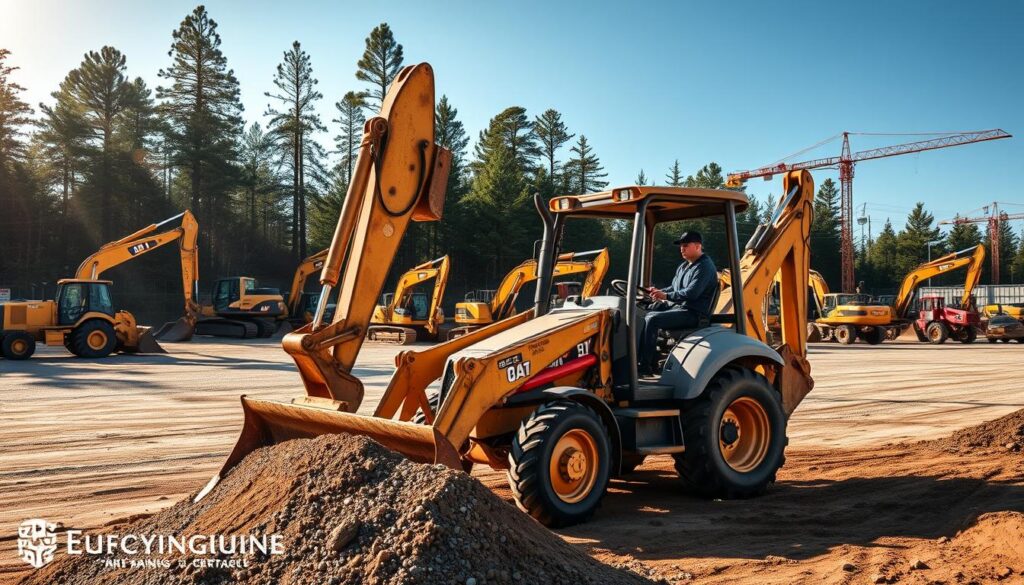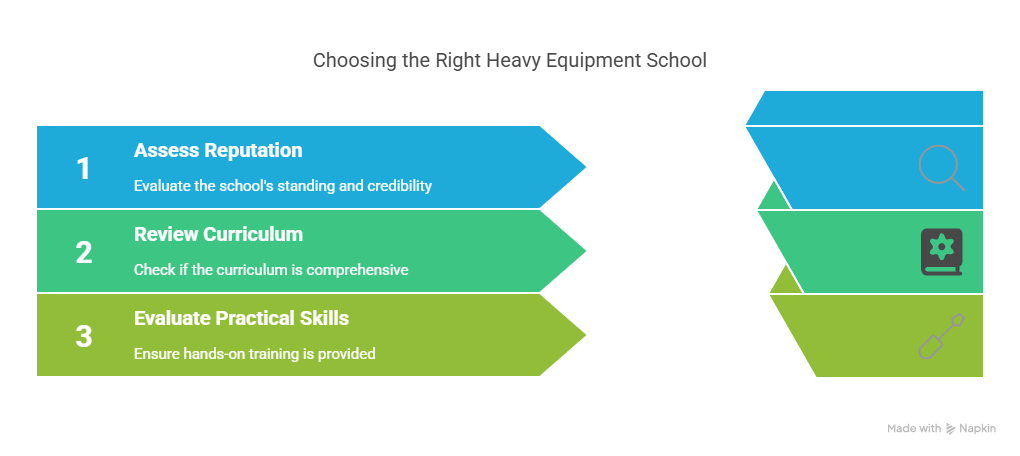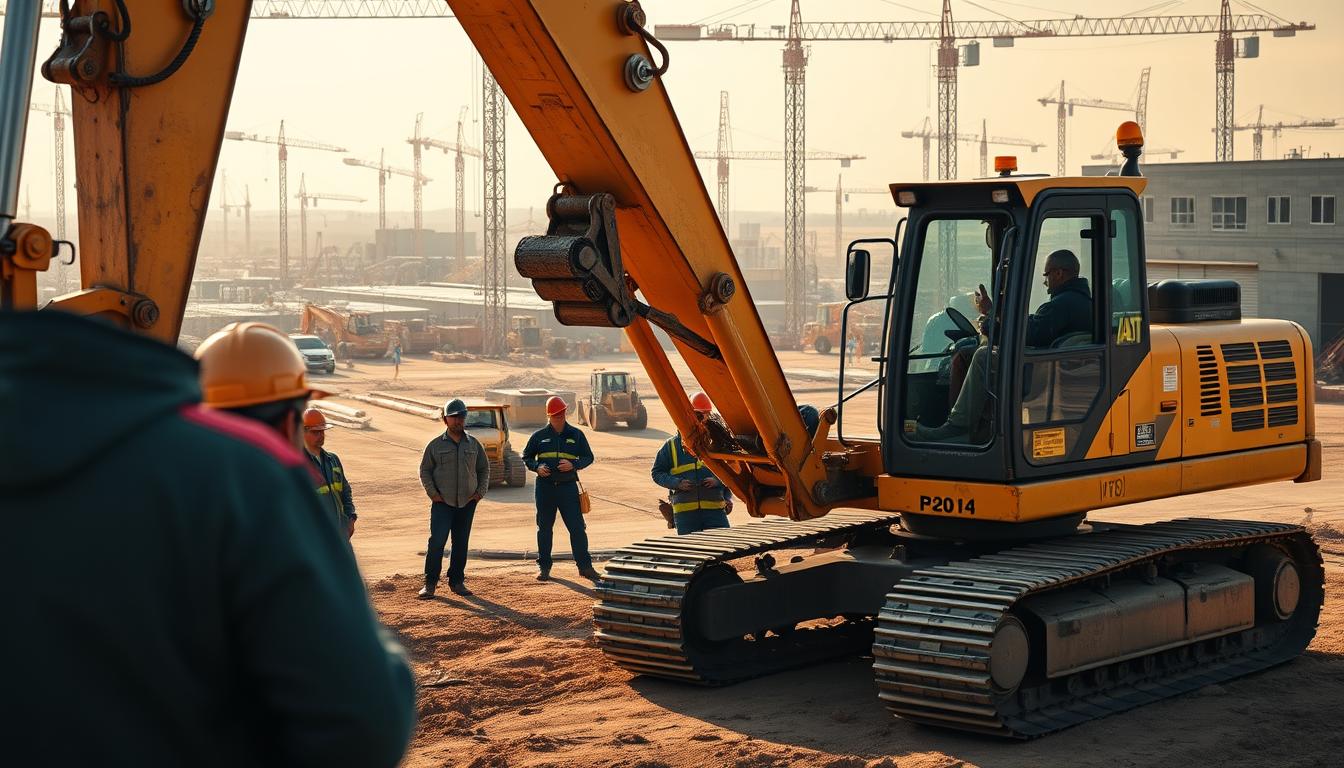Heavy Equipment Operator School is often the first step for those embarking on a career as a heavy equipment operator, which can be both rewarding and challenging. With the construction industry continually evolving, the demand for skilled operators is on the rise.
At a reputable heavy equipment school, you can gain the necessary skills and training to operate various types of machinery, including excavators, loaders, and cranes. This initial step towards a lucrative career is crucial, and choosing the right training program is paramount.
By enrolling in a heavy machinery training program, you open yourself up to a world of opportunities in the construction industry. It’s the first step towards a career that is both fulfilling and in high demand.
Why Choose a Heavy Equipment School for Your Career
Enrolling in a heavy equipment school is a strategic move for those seeking a stable career. The decision to pursue a career in heavy equipment operation is often driven by the desire for job security and a competitive salary.
The construction industry is experiencing significant growth, driven by infrastructure projects and urban development. This growth has led to an increased demand for skilled heavy equipment operators.
The Growing Demand for Skilled Operators
The demand for skilled operators is not just a current trend but a long-term necessity. As infrastructure projects continue to rise, the need for professionals who can operate complex machinery efficiently and safely becomes more pressing.
Key statistics highlighting the demand include:
| Industry | Projected Growth | Median Salary |
|---|---|---|
| Construction | 8% growth by 2030 | $48,000 – $80,000 |
| Mining | 5% growth by 2030 | $60,000 – $100,000 |
| Infrastructure Development | 10% growth by 2030 | $50,000 – $90,000 |
Salary Potential and Job Security
One of the most compelling reasons to enroll in a heavy equipment operator course is the potential for a lucrative salary. Skilled operators are well-compensated due to their critical role in construction and infrastructure projects.
Job security is another significant advantage. With the ongoing growth in industries that rely on heavy equipment, the demand for skilled operators is expected to remain high, providing a stable career path.
By obtaining heavy equipment certification, individuals can significantly enhance their employability and career prospects. This certification demonstrates a level of competence and commitment to potential employers, making certified operators more attractive candidates.
What You’ll Learn in Heavy Equipment Operator Training
A heavy equipment school near me provides the necessary training to become a skilled operator, covering a wide range of topics and skills.
Mastering Excavators, Loaders, and Cranes
The construction equipment training program is designed to equip students with the knowledge and practical skills required to operate heavy machinery safely and efficiently. You’ll learn to operate various types of equipment, including:
- Excavators: Understanding how to maneuver and control excavators for digging and moving large amounts of soil or debris.
- Loaders: Learning to operate loaders for loading materials into trucks or moving them around the construction site.
- Cranes: Mastering the operation of cranes for lifting and placing heavy loads.

Safety Protocols and Industry Standards
Safety is a critical component of any heavy equipment operator training program. You’ll be taught to follow strict safety protocols and adhere to industry standards to prevent accidents and ensure a safe working environment.
Some key safety practices include:
- Conducting pre-operational checks on equipment.
- Understanding load calculations and stability.
- Following proper signaling and communication procedures.
Hands-On vs. Classroom Training
A comprehensive construction equipment training program combines both hands-on training and classroom instruction. Hands-on training allows you to practice operating heavy equipment under the supervision of experienced instructors, while classroom instruction provides the theoretical foundation necessary for safe and effective operation.
Balancing both aspects is crucial for developing a deep understanding of the equipment and the skills required to operate it efficiently.
Finding the Right Heavy Equipment School Near You
When it comes to launching a successful career as a heavy equipment operator, the choice of training school is paramount.
With so many options available, it’s essential to consider several factors to make an informed decision. A reputable heavy equipment training school should offer a comprehensive curriculum that covers both theoretical knowledge and practical skills.
Key Factors to Consider When Choosing a Program
When selecting a heavy equipment school, several key factors come into play. These include the school’s accreditation status, the qualifications of its instructors, and the condition of its equipment.
- Accreditation: Ensure the school is accredited by a recognized accrediting agency.
- Instructor Qualifications: Instructors should have industry experience and teaching qualifications.
- Equipment Condition: The school should have modern, well-maintained equipment for training.
Certification Requirements and Benefits
Obtaining heavy equipment operator certification is a critical step in a prospective operator’s career. Certification demonstrates a level of competence and commitment to safety and professionalism.
| Certification Type | Description | Benefits |
|---|---|---|
| OSHA Certification | Occupational Safety and Health Administration certification focusing on safety protocols. | Enhances job prospects and ensures compliance with safety regulations. |
| NCCCO Certification | National Commission for the Certification of Crane Operators certification for crane operators. | Signifies expertise and is often required by employers. |
Financing Options and Assistance

Understanding the cost of attending a heavy equipment school and exploring available financing options is crucial. Many schools offer financial aid, scholarships, or flexible payment plans to help students fund their education.
It’s advisable to inquire about these options when contacting potential schools to plan your finances effectively.
Conclusion: Taking the First Step Toward Your Heavy Equipment Career
Enrolling in a heavy equipment school is a significant step towards a fulfilling career in the construction and heavy machinery operation sectors. With the knowledge and skills gained from crane operator training programs, individuals can look forward to a future filled with opportunities.
By choosing the right heavy equipment school, you can master the operation of complex machinery, understand safety protocols, and gain industry-recognized certifications. This training not only enhances your job prospects but also opens doors to better salary potential and job security.
Take the first step towards your new career by exploring local heavy equipment schools that offer comprehensive training programs. With dedication and the right training, you can become a skilled heavy equipment operator and enjoy a successful career in this in-demand field.
FAQ
What is the typical duration of a heavy equipment operator training program?
The duration of a heavy equipment operator training program can vary depending on the institution and the specific program. Typically, these programs can last from a few weeks to several months, with some comprehensive programs taking up to a year to complete.
What kind of certification can I expect to receive upon completing a heavy equipment operator course?
Upon completing a heavy equipment operator course, you can expect to receive a certification that is recognized by the industry. The specific certification may vary depending on the program and the equipment you’ve been trained on, such as crane operator certification or excavator operator certification.
Are there any prerequisites for enrolling in a heavy equipment school?
Prerequisites for enrolling in a heavy equipment school can vary, but generally, a high school diploma or equivalent is required. Some programs may also require a valid driver’s license, a certain level of physical fitness, or prior experience in a related field.
How do I find a heavy equipment school near me?
To find a heavy equipment school near you, you can search online using keywords like “heavy equipment school near me” or “construction equipment operator school near my location.” You can also check with local vocational schools, community colleges, or industry associations for recommendations.
What financing options are available for heavy equipment operator training?
Financing options for heavy equipment operator training can include federal financial aid, scholarships, grants, and financing plans offered by the training institutions. Some programs may also be eligible for veterans’ benefits or workforce development funding.
What kind of job opportunities are available after completing heavy equipment operator training?
After completing heavy equipment operator training, you can expect to find job opportunities in various sectors, including construction, mining, and infrastructure development. You may work as an excavator operator, crane operator, loader operator, or in other roles that require operating heavy machinery.
Is hands-on training a significant part of heavy equipment operator programs?
Yes, hands-on training is a crucial component of heavy equipment operator programs. Most programs combine classroom instruction with practical training on actual heavy machinery, ensuring that students gain both theoretical knowledge and real-world experience.




